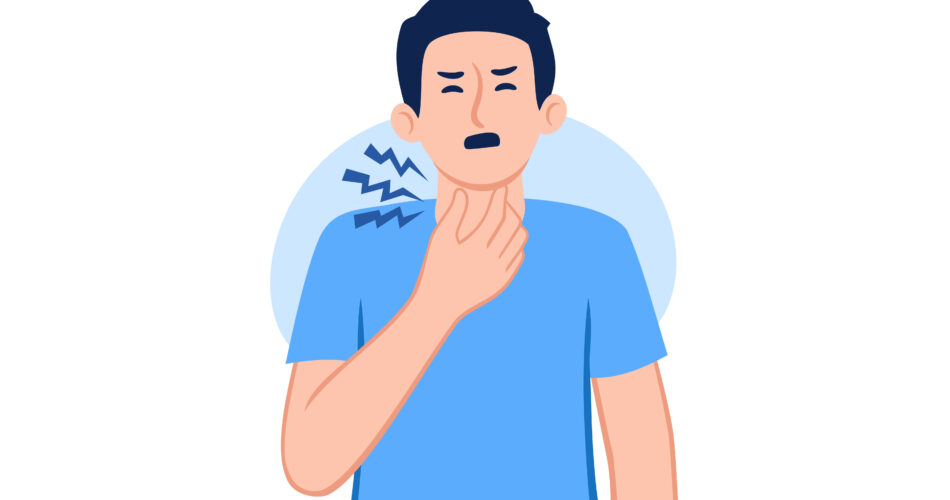There are two ways on how people develop sore throats, and strep throat is one of conditions that should be addressed immediately. However, that can only happen by knowing the strep throat symptoms which can show severe signs of sore throat.
If you think you do have this oral condition, then you’re on the right track. In this blog, we’ll uncover the different strep throat symptoms, and how it can risk the patient’s health. Let’s begin the discussion below!
What is Strep Throat

Strep throat is a common bacterial infection that affects the throat and tonsils. It is caused by a bacterium called Streptococcus pyogenes, also known as group A streptococcus.
Take note that this condition can occur in people of all ages, but it is most common in children. It spreads through respiratory droplets when an infected person coughs or sneezes, or through shared food or drinks. The bacteria can also be picked up from surfaces and transferred to the nose, mouth, or eyes.
How Strep Throat Affects Your Throat Health
This condition can significantly impact your throat health due to the inflammation and irritation in the throat. When an individual is suffering from strep throat, they may experience painful swallowing and red and swollen tonsils. At the same time, instances like white patches or streaks of pus on the tonsils, as well as swollen lymph nodes in the neck can occur. In short, the patient can experience difficulties when eating their food due to the consequences of developing strep throat.
Identifying Strep Throat Symptoms
The strep throat symptoms can vary from mild to severe. In severe cases, additional symptoms like rash or stomach pain could be present. That’s why early recognition of strep throat symptoms must occur for effective management and prevent serious complications.
Here are some of the strep throat symptoms to monitor for early recognition of the condition:

Recognizing Early Symptoms of Strep Throat
Look out for classic signs like a sore throat, difficulty swallowing, and fever. White patches or red spots at the back of your throat may also indicate strep throat. At the same time, try to pay attention to swollen lymph nodes in your neck and avoid dismissing symptoms like headaches or stomach pain
If you suspect strep throat, seek advice from your healthcare provider for accurate diagnosis and appropriate management of your throat condition. Early intervention can prevent complications and promote a swift recovery.
Diagnosis and Confirmation
During diagnosis, healthcare providers typically conduct a throat examination to look for signs of strep throat, such as red spots or white patches. To confirm the infection, a throat swab is taken for a strep test. This test can detect strep bacteria promptly, guiding appropriate treatment.

In some cases, patients can be a strep carrier, which is someone that tests positive without strep throat symptoms. With that, a throat culture may be needed for conclusive results.
The Role of Strep Tests in Confirming Your Condition
Strep tests play a crucial role in definitively confirming the presence of strep throat. These tests are instrumental in distinguishing strep throat from other throat infections, aiding healthcare providers in prescribing the most effective treatment.
Rapid strep tests, often conducted in provider offices, offer quick results, enabling prompt initiation of appropriate care. Throat swabs are commonly used for these tests, providing accurate and timely diagnosis. By confirming the presence of streptococcal bacteria, strep tests guide health professionals in accurately managing and treating your condition.
Managing Strep Throat Symptoms
When dealing with strep throat, effective management strategies play a crucial role in recovery. There are several possible steps to take to successfully manage the detected strep throat symptoms. Of course, one of the best ways to go is to follow the recommended treatment plan from your doctor.
Medical treatments may include antibiotics to combat the inflammation and other effects of the strep throat bacteria. In that case, it is important to follow the right dosage and finish the recommended duration of intake for the antibiotics to take effect.

Aside from the medication aspect, patients can also begin their healing journey through remedies at home. This type of management of the strep throat symptoms is commonly used to alleviate the discomfort, even for a short time. That includes small actions like the following:
- resting your voice
- staying hydrated with warm liquids
- gargling with salt water
- consuming soft foods
- ensuring good oral hygiene
- over-the-counter throat spray or pain medication
If symptoms persist or worsen, seek immediate care or advice from a doctor.
Frequently Asked Questions
How can untreated strep throat affect overall health?
Untreated strep throat can potentially lead to complications affecting overall health. If left untreated, strep throat can progress to conditions such as rheumatic fever, kidney inflammation, or ear infections. These complications can cause serious health problems and may require more intensive treatment. Therefore, it is crucial to seek medical attention promptly if you suspect you have strep throat symptoms to prevent any further health complications.
Can strep throat cause flu?
No. Strep throat is caused by a harmful bacteria, specifically streptococcus bacteria. On the other hand, the flu is caused by influenza viruses. While both can cause sore throat and fever, they are distinct illnesses with different causes and treatments.
Final Takeaway
Dealing with strep infection is a crucial condition to address immediately. That can happen through knowing the warning signs or strep throat symptoms. These symptoms can vary from mild to severe, and must be acknowledged as consequences can possibly occur. Thus, affecting the overall health in the future.Remember, early detection and appropriate treatment play a vital role in combating this condition. Book an online consultation or visit a primary care doctor once symptoms persist.
Strep Throat Knowledge Quiz
Test your understanding of strep throat symptoms, treatment, and prevention


